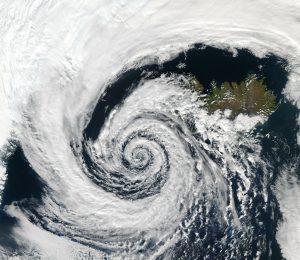
A ‘polar low’ approaching Ireland. Image from Pixabay.
While mid-latitude storms tend to get less attention than tropical cyclones, the impacts of an intense mid-latitude storm such as this can be extreme – particularly in terms of snowfall, winds, and coastal erosion/flooding. See the article for more on how intense ‘bomb’ cyclones develop: https://theconversation.com/what-is-a-bomb-cyclone-an-atmospheric-scientist-explains-175825
For research connected to these events, see my CV and research updates on this website!